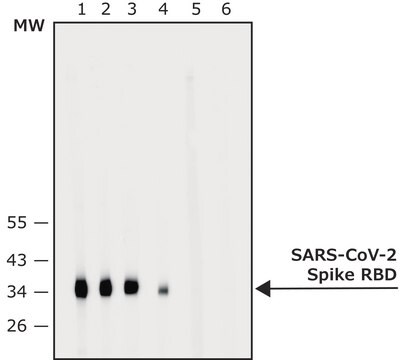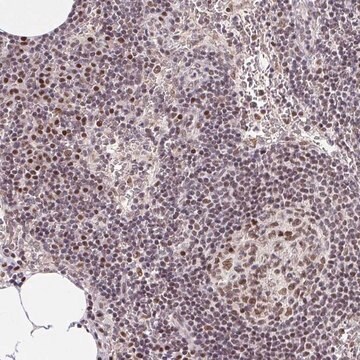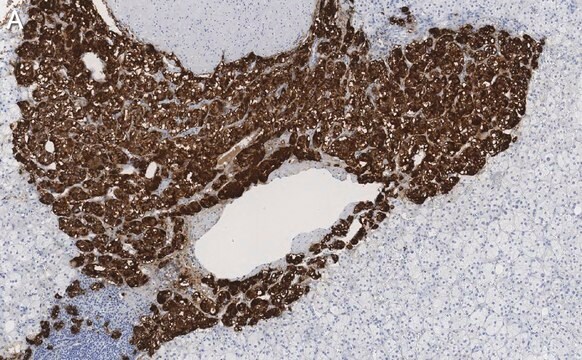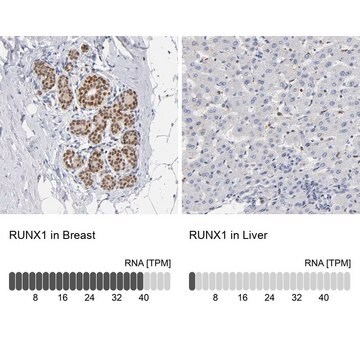MAB5434-C
Anti-Oct-1 Antibody, clone YL15, Ascites Free
clone YL15, from mouse
Synonym(s):
POU domain, class 2, transcription factor 1, NF-A1, Oct-1, Octamer-binding protein 1, Octamer-binding transcription factor 1, OTF-1
About This Item
ICC
IF
IHC
WB
immunocytochemistry: suitable
immunofluorescence: suitable
immunohistochemistry: suitable (paraffin)
western blot: suitable
Recommended Products
biological source
mouse
Quality Level
antibody form
purified antibody
antibody product type
primary antibodies
clone
YL15, monoclonal
species reactivity
human, mouse
technique(s)
ChIP: suitable
immunocytochemistry: suitable
immunofluorescence: suitable
immunohistochemistry: suitable (paraffin)
western blot: suitable
isotype
IgG1κ
NCBI accession no.
UniProt accession no.
shipped in
wet ice
target post-translational modification
unmodified
Gene Information
human ... POU2F1(5451)
mouse ... Pou2F1(18986)
General description
Specificity
Immunogen
Application
Western Blotting Analysis: A representative lot detected Oct-1, but not Oct-2, Oct-4, or Oct-6 in various human cell lysates and nuclear extracts (Maddox, J., et al. (2012). PLoS Genet. 8(11):e1003048).
Western Blotting Analysis: A representative lot detected Oct-1 in Burkitt lymphoma cells (BJAB and Namalwa), as well as a panel of six primary effusion lymphoma (PEL) cells (Di Bartolo, D.L., et al. (2009). J. Virol. 83(9):4308-4315).
Immunofluorescence Analysis: A representative lot detected Oct-1 immunoreactivity in paraformaldehyde-fixed human and mouse frozen colon tissue sections by fluorescent immunohistochemistry (Maddox, J., et al. (2012). PLoS Genet. 8(11):e1003048).
Immunohistochemistry Analysis: A representative lot detected Oct-1 immunoreactivity in formalin-fixed, paraffin-embedded human colon tissue sections (Maddox, J., et al. (2012). PLoS Genet. 8(11):e1003048).
Chromatin Immunoprecipitation (ChIP) Analysis: A representative lot detected Oct-1 occupancy at the ORF50 promoter, using stable Oct-2-inducible primary effusion lymphoma (PEL) cell line BC1/Tet-on/Oct-2. The association decreased upon induction of Oct-2 expression and enhanced upon ORF50 transfection (Di Bartolo, D.L., et al. (2009). J. Virol. 83(9):4308-4315).
Chromatin Immunoprecipitation (ChIP) Analysis: A representative lot detected Oct-1 occupancy at the U6 and U1 promoter regions in exponentially dividing HeLa cells (Zhao, X., et al. (2001). Mol. Cell. 7(3):539-549).
Electrophoretic Mobility Shift Assay (EMSA): A representative lot caused a supershift of radiolabeled OCT1 consensus oligonucleotide-bound complex in the nuclear extracts from Burkitt lymphoma cells BJAB and Namalwa (Di Bartolo, D.L., et al. (2009). J. Virol. 83(9):4308-4315).
Immunocytochemistry Analysis: A representative lot detected Oct-1 cellular localization in human diploid fibroblast MRC-5-derived HuS-L12 cells at various population-doubling levels (PDLs), as well as in the corresponding immortalized IML12–4 cells by fluorescent immunocytochemistry (Imai, S., et al. (1997). Mol. Biol. Cell. 8(12):2407-2419).
Immunoprecipitation Analysis: A representative lot immunoprecipitated Oct-1 from HEK293 cell lysates (Lai, J.S., and Herr, W. (1992). Proc. Natl. Acad. Sci. U. S. A. 89(15):6958-6962).
Epigenetics & Nuclear Function
Transcription Factors
Quality
Western Blotting Analysis: 2.0 µg/mL of this antibody detected Oct-1 in 10 µg of HeLa cell lysate.
Target description
Linkage
Physical form
Storage and Stability
Other Notes
Disclaimer
Not finding the right product?
Try our Product Selector Tool.
Storage Class Code
12 - Non Combustible Liquids
WGK
WGK 1
Flash Point(F)
Not applicable
Flash Point(C)
Not applicable
Certificates of Analysis (COA)
Search for Certificates of Analysis (COA) by entering the products Lot/Batch Number. Lot and Batch Numbers can be found on a product’s label following the words ‘Lot’ or ‘Batch’.
Already Own This Product?
Find documentation for the products that you have recently purchased in the Document Library.
Our team of scientists has experience in all areas of research including Life Science, Material Science, Chemical Synthesis, Chromatography, Analytical and many others.
Contact Technical Service







